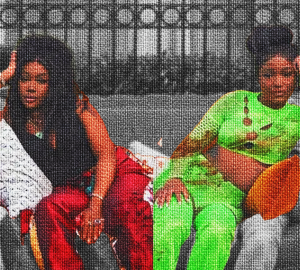The Writer’s Corner features poetry, essays, short stories, satire and various fiction and non-fiction from SCAD Atlanta students. To submit your own work for the Writer’s Corner, email features@scadconnector.com

‘On Tattoos’ by Vrishti Savalani
Tattoos are permanent. Depending on the kind of person you are, this is either really exciting or really daunting. The day I got my first tattoo is easily one of the most unforgettable days. Funny enough, I don’t remember much about getting the tattoo itself. Maybe the pain from the needle was enough to black out that moment, or maybe what came after seemed to leave more of an impact than the permanent design on my arm.
Shortly after getting it, I was barely able to contain myself in the back seat of my friend’s car. I immediately called my parents without taking the 12-hour time difference into consideration. My happiness was reason enough to wake them up in the early hours of a Friday morning for them, and a sunny evening for me. But even that golden hour glow turned dark when they answered.
My dad had told me that someone I knew was in a car accident, and that he was in the ICU. He wasn’t someone I knew personally — I’d only known him by his name and face. He was a friend of several friends of mine. His family was well known amongst the circle of Indians living in Hong Kong. Even though I didn’t really know who he was, I knew of him. The details of what he went through were a little blurry through FaceTime, but I heard enough to feel the shock of the situation. I’d heard about accidents happening all the time. At this point, I’d lived in Atlanta for almost a year — a city notorious for bad drivers and where every other Instagram story was a traffic report telling us which roads to avoid. I didn’t even witness this accident through a 30 second clip on my phone, I’d only heard the words from my dad and that was enough to scare me.
For the next few days, I was given strict instructions to follow in order to let the tattoo heal properly. As I layered my arm in Aquaphor and cling wrap, all I kept thinking about was this guy. I can’t remember much about how I felt, but I do remember underestimating everything that happened to him. People have gotten in car accidents before and have come out the other end with scars and anecdotes for parties. And all I heard about him was the vague news my dad would give based on something my aunt who lived in Hong Kong told him. I knew he was in the ICU, but I also tried to keep telling myself that he would make it out. He would probably spend a few days or weeks in the hospital, and eventually go back to starting this new stage of his life as a college student. He travelled all the way to the other side of the world for it, he deserved to be in his classes in the fall.
After a week or so, I began to let my tattoo breathe more. I was told that covering it up in cling wrap too often would actually make things worse, and that the scars needed the air to let them heal properly. I’d only wrap it up at night — even though it needed the air, I needed to give myself the peace of mind knowing it wouldn’t get infected when I wasn’t awake to take care of it. In that time, I wasn’t thinking much about the accident, nor were my parents updating me on his condition. I went back to scrolling through my Instagram stories, and a mutual friend posted a picture of her and the guy with the words “Forever in my heart” with a little dove emoji right next to it. This was all I saw. At this very moment, no one else who knew him posted any pictures or tributes. It was only this one picture. I fell down this rabbit hole of wanting to know more but didn’t get very far with the lack of social media posts. I called my aunt later that day and asked about the guy. He didn’t make it.
For the next few days, that’s all I thought about. I was in shock. How could someone so young lose his life so quickly? I was frustrated. Someone who was about to start a whole new stage in his life had it taken away from him in the worst way possible — in a pandemic, in a foreign country, because of a mistake someone else made. I kept finding myself refreshing my social media and looking at all these tribute posts from his friends. I began to know more about him when he was no longer here. I built an actual human being from captions and pictures.
I couldn’t tell why this scared me, or why I was upset about it. Death is always sad, but this felt personal, and I still haven’t been able to understand why.
Tattoos, like death, are permanent. In the beginning, it starts off as a small wound that is slowly engraved on you. At first, you won’t know how to treat it. You’ll cover it up in cling wrap and try to stop everything around you from infecting it and making you feel worse. But even coddling it too much will hurt it more than it can help it. Over time, it’ll fade — the color will start to look duller and those clear and sharp lines will soften. It’ll still be reminiscent of the first time that needle slowly punctured your skin. As your body changes, so does its appearance on your flesh. What you’re left with is a reminder — a symbol of who you were at this moment in your life and everything you experienced then.
When I look at my tattoo, I don’t remember much about the actual experience itself. When I look at it, I think of the guy who lost his life because of a mistake that someone else made. I think of what he could’ve done with the world if only he got to start that new stage of his life. I think of the person I never got to meet, but the one I got to know through the lens of his grieving loved ones. For them, his death will be a scar — a permanent reminder of that moment in their lives. And for me, my tattoo will be the reminder of how loss actually seemed to reveal more than when that person was alive.


























